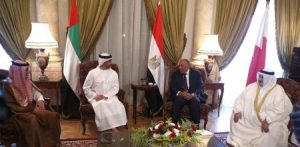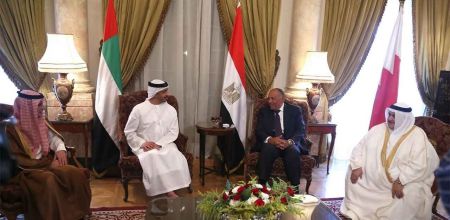 Saudi Arabia and its allies, which are boycotting Qatar, have presented Doha with six principles to be fulfilled in what appears an abandonment of the 13 demands issued last month as conditions to be fulfilled by Qatar for the normalization of ties.
Saudi Arabia and its allies, which are boycotting Qatar, have presented Doha with six principles to be fulfilled in what appears an abandonment of the 13 demands issued last month as conditions to be fulfilled by Qatar for the normalization of ties.
Saudi Arabia’s permanent envoy to the UN Abdallah Al-Mouallimi briefed a group of UN reporters about the six principles, which, he said, would be easy for Qatar to abide by after it rejected the first 13 demands, arguing that they were unrealistic.
Mouallimi said the six principles came up during the July 5 meeting of foreign ministers of Saudi Arabia, United Arab Emirates (UAE), Bahrain and Egypt in Cairo.
Saudi Arabia, UAE, Bahrain and Egypt severed ties with Qatar over funding of terrorism. The bloc also cut ground, air and sea links with their neighbor.
The principles include Qatar’s commitment to combat extremism and terrorism, prevent financing and granting safe havens for such groups, and suspend all acts of provocation and speeches inciting hatred or violence.
The quartet says it will not negotiate the principles and that and the implementation and monitoring of these principles were necessary for the normalization of ties.
They however said they are open for details of “the tactics” and “the tools” of the implementation of the principles.
The bloc pointed out that if Qatar achieves curbing incitement to violence, the demand to shut down Doha-based Al Jazeera network channel will no longer be necessary.
“If the only way to achieve that is by closing down Al-Jazeera, fine,” Mouallimi said.
“If we can achieve that without closing down Al-Jazeera, that’s also fine. The important thing is the objective and the principle involved.”
Kuwait and the US have been mediating the crisis between the US allies. US Secretary of State Rex Tillerson urged Qatar’s gulf neighbors to reach a solution through dialogue after he indicated that some of 13 demands were not “actionable”.
Qatar and the US last week signed a Memorandum of Understanding (MoU) on terrorism financing. The Saudi-led group hailed the agreement but said it was not enough.
“We’d like to see more of that,” said UAE Minister of State for International Cooperation Reem Al Hashimy.
“We’d like to see stronger measures taken and stronger commitment made to address that,” she added.
“We’re looking for a serious change in behavior, serious measures,” she noted adding that at this stage the ball is on Qatar’s court.
